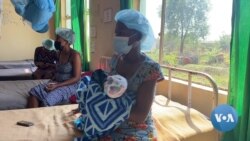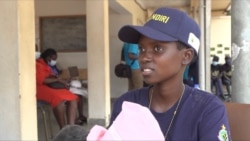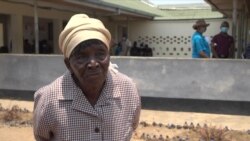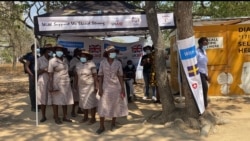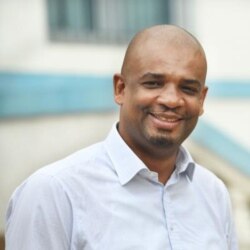Belinda Kaziwisi of Mount Darwin, Zimbabwe, about 200 kilometers north of Harare, is among the Zimbabwean mothers seeing the benefits that have grown from money provided by UNICEF.
“What I see has changed for the better is that from when I got pregnant until up to the delivery of my child, I didn’t pay anything," Kaziwisi said, her healthy baby in her arms. "When I delivered, I was given soap, cotton and other things for free. It was all nice compared with what used to happen before.”
With funding from UNICEF, the Zimbabwe government has hired health workers who encourage pregnant mothers in rural villages to seek assistance from the country’s health institutions to avoid complications.
“We encourage pregnant mothers to come to clinics," said Letty Chindundu, one of the health workers. "We tell them: When you get to the third month of your pregnancy, please go to the clinic. Health workers there will tell you what to do. The journey to delivery of your baby becomes easy. Even your baby will be taken care of while in the tummy, since there are now so many diseases. If they do not come to clinic, the baby may be delivered with ailments. That’s how we encourage them to come to clinic — when they [become] pregnant.”
Dr. Tajudeen Oyewale, the UNICEF representative in Zimbabwe, said that having health workers in rural villages and funding the country’s health sector are paying off.
“[According to] the latest results of the Multiple Indicator Cluster Survey, Zimbabwe has successfully halved the maternal mortality ratio in the last 10 years, and this is a combination of different efforts [by] everyone," Oyewale said. "The challenges are real because the world is evolving. We did not [know] COVID was going to come. What is great about what I have seen is innovation. The problem comes, our people innovate.”
Dr. Aboubacar Kampo, UNICEF’s director of health programs, was a junior official in Zimbabwe for the U.N. agency when it launched the Health Transition Fund, a multidonor pooled fund to support the country’s barely functioning health sector, about a decade ago.
This week, Kampo has been in Zimbabwe to assess whether the fund has changed Zimbabwe’s maternal, newborn and child health systems. He said the fund was bearing fruit.
“I am very pleased with the progress which Zimbabwe has made in terms of providing health care to the entire population," Kampo said. "It is not perfect. But I think Zimbabwe can be proud of the achievement made. I think you have fully functional health systems, in particular primary health care. What I have seen is an integrated system.”
Kampo, a Mali national, said Zimbabwe now has a fully functional health system in primary health care, a sharp contrast to what the nation had nearly a decade ago.




